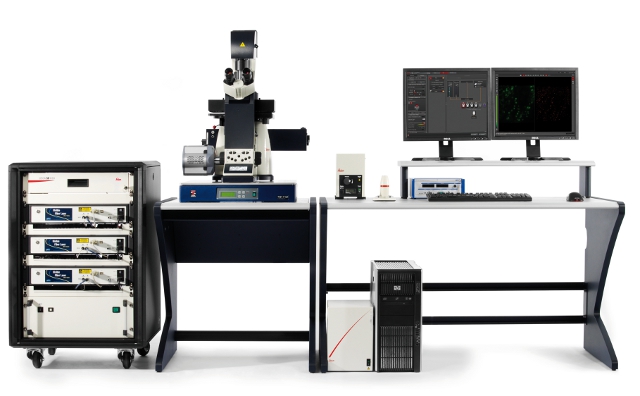The Leica SR GSD is a winner of the R&D100 Award, granted by R&D Magazine for outstanding technical developments. It is the 50th anniversary of this prestigeous award.
Leica Microsystems was honored together with the Max Planck Institute for Biophysical Chemistry in Göttingen for the development of this ground-breaking widefield super-resolution microscope.
Superlative resolution and reliability
Launched in August 2011, this microscope system achieves resolutions far below the limit of diffraction never attained before in a commercial widefield fluorescence microscope. The Leica SR GSD is capable of resolving details as small as 20 nanometers. This provides the resolution to image single proteins and biomolecules in cells to observe molecular processes. The Leica SR GSD is based on GSDIM technology (Ground State Depletion followed by Individual Molecule return) developed by Professor Stefan Hell at the Max Planck Institute). One of the key advantages of the GSDIM method over other localization techniques is that it can be used with standard fluorescence labels routinely applied in biomedical research.
The Leica SR GSD is not only remarkable for offering higher resolution than previously possible, but also for its efficiency. One example is the novel SuMo Stage (Supressed Motion Stage) that ensures minimal (sub resolution) drift. Besides gaining unprecedented accuracy in localization of molecules, the user of a Leica SR GSD also sees the super-resolution image during acquisition - with no post-processing or need of fiducial markers. More information on the super-resolution systems of Leica Microsystems can be found on their website.
"This is a great honor for the entire team and rewards the outstanding quality and unique performance of our super-resolution systems, which help in uncovering and answering new scientific questions," comments Sebastian Tille, Head of ‘Widefield Imaging’ at Leica Microsystems’ Life Science Division. "The fact that this is already the third time this year that the Leica SR GSD was selected for an award nominated by an international panel of experts is further evidence of its truly innovative character."
Based on many years of experience and success with the confocal super-resolution technologies of STED and STED CW, Leica Microsystems has again set new standards in nanoscopy with the Leica SR GSD. The company has continued its series of innovations with the new Leica gated STED - a patented technology for enhanced confocal super-resolution based on the temporal properties of STED fluorescence emission.
 Leica SR GSD Microscope System
Leica SR GSD Microscope System